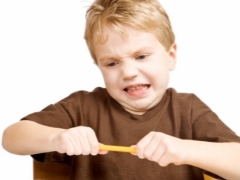Treatment of hyperactivity in children of school age
Hyperactivity (ADHD) is a very common problem in childhood. It is especially often diagnosed in schoolchildren, since learning tasks and various household tasks over the age of 7 require the child to be attentive, self-organized, assiduous, able to finish things. And if the child has hyperactivity syndrome, it is precisely these qualities that he lacks, which causes problems with learning and in everyday life.
In addition, ADHD prevents schoolchildren from communicating with their classmates, so the correction of this problem is important for the child’s social adaptation.

Causes of hyperactivity
Studies have shown that many children have attention deficit disorder with hyperactivity due to genetic factors. Other provoking factors for ADHD include:
- Problems with the course of pregnancy. If the mother was threatened with interruption, she was malnourished, was under stress, smoked, and the fetus was hypoxic or had developmental defects, this contributes to the appearance of problems with the nervous activity of the child, including ADHD.
- Problems with the flow of labor. The emergence of hyperactivity in children contribute to both rapid and prolonged labor, as well as too early onset of labor and stimulation of labor.
- Deficiencies education. If the parents treat the child too strictly or the child witnesses constant conflicts in the family, this affects his nervous system.
- Lack of nutrients or poisoning, for example, with heavy metals. Such factors worsen the work of the central nervous system.
Symptoms of ADHD at school age
The first signs of hyperactivity in many babies manifest themselves in infancy. Babies with ADHD do not sleep well, move a lot, react too violently to any changes, are very attached to their mother and quickly lose interest in toys and games. At preschool age, such kids cannot sit in kindergarten classes, often show aggression towards other children, run a lot, deny any restrictions.
Schoolchildren ADHD is manifested by the following symptoms:
- In class, the child is inconsiderate and quickly distracted.
- His movements are restless. Such a student often turns around in a lesson, cannot sit still in a chair calmly, and in a situation requiring staying in one place, can get up and leave.
- The child runs and jumps in situations where it is not necessary to do.
- He is unable to do anything calmly and quietly for a long time.
- The child often does not complete household chores or lessons.
- It's hard for him to wait in line.
- He can't organize himself.
- The child tries to avoid any tasks for which you need to be careful.
- He often loses his own things and forgets something important.
- The child has an increased talkativeness. He often interrupts others and does not allow people to finish a phrase or question.
- The child cannot find a common language with classmates and often conflicts with them. He is trying to intervene in other people's games and does not follow the rules.
- The student often behaves impulsively and does not evaluate the consequences of his own actions. He can break something, and then deny his own involvement.
- Child sleeps restlessly, constantly turning over, crumpling bedclothes and throwing off the blanket.
- In a conversation with a child, the teacher feels as if he does not hear him at all.
What doctor treats
Suspecting schoolchild hyperactivity syndrome, you should go with him for a consultation to:
- Child neurologist.
- Child psychiatrist.
- Child psychologist.
Any of these specialists will examine the child, give him to perform test tasks, and also communicate with his parents and schedule additional examinations of the nervous system. Based on the results, the child will be diagnosed with ADHD and prescribed the correct treatment.
At what age does ADHD most often pass?
Most clearly the signs of hyperactivity are manifested in preschool children attending kindergarten, as well as in younger schoolchildren aged 8-10 years. This is due to the peculiarities of the development of the central nervous system at such age periods and the need to perform tasks for which it is important to be attentive.
The next peak of manifestations of ADHD is noted in the period of sexual restructuring in 12-14-year-old children. Over the age of 14 many teenagers symptoms of hyperactivity smoothed out and may disappear independently, which is associated with compensation for missing functions of the central nervous system. However, in some children, ADHD persists, which leads to the formation of the behavior of a “difficult teenager” and asocial inclinations.
How and what to treat
The approach to the treatment of hyperactivity in the student should be comprehensive and include both medication and non-drug therapy. With ADHD you need:
- Engage with a psychologist. The doctor will use techniques to reduce anxiety and improve the child’s communication skills, and give exercises for attention and memory. If there are speech disorders, classes with speech therapist are also shown. In addition, a psychologist should go not only to a hyperactive child, but also to his parents, since they often develop irritability, depression, intolerance, and impulsivity. During visits to the doctor, parents will understand why prohibitions are contraindicated for children with hyperactivity and how to build relationships with a hyperactive schoolchild.
- Provide the child with proper physical activity. For the student, you should choose a sports section, in which there will be no competitive activity, as it can aggravate hyperactivity. Also, for a child with ADHD, static loads and sports in which there are demonstrations are not suitable. The best choice is swimming, cycling, skiing and other aerobic exercise.
- Give the child the medicines and medicines prescribed by the doctor. Abroad, children with hyperactivity prescribe psychostimulants, and we prefer nootropic drugs, as well as write out soothing medication. The specific drug and its dosage should be selected by the doctor.
- Apply folk remedies. Since drug treatment for ADHD is prescribed for a long period, from time to time synthetic medicines are replaced with herbal teas, such as mint, valerian, lemon balm, and other plants with a positive effect on the nervous system.
Tips for parents
- Try to build a relationship with the student, the basis of which will be trust and mutual understanding.
- Help your son or daughter to organize your daily routine, as well as a place for games and lessons.
- Pay attention to the sleep mode of the child. Let him fall asleep and wake up at the same time every day, even on weekends.
- Provide your child with a balanced, tasty diet, in which refined and synthetic products will be limited.
- Prohibit the child only what really hurts him or is dangerous for him.
- Show your love for the child more often.
- Avoid communicating orders, use requests more often.
- Give up physical punishment.
- Often praise the child, noting all the positive aspects and actions.
- Do not quarrel with the child.
- Try to organize joint leisure, for example, family forays into nature.
- Give your child the best possible daily chores and do not perform them instead.
- Keep a notebook in which in the evening with your child write down all the successes and positive moments of the day.
- Try not to go to very crowded places with your child, for example, a market or a shopping center.
- Make sure the child does not overwork. Control time at the TV or computer.
- Keep calm and calm, because you are an example for your child.
In the next video, Dr. Komarovsky will talk about what rules should be followed in raising a hyperactive child.
A very important role in the correction of the child’s behavior is assigned to parents. How to behave, see the next video of a clinical psychologist Veronika Stepanova.











